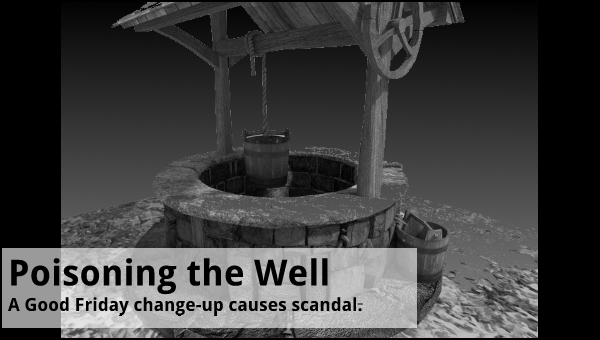By Tyson Thorne

The headline read “Bishop receives hate mail” and, Of course, I had find out why. After all, who would write a bishop hate mail, if not other Christians? I’m sure our catholic readers will understand this more than us protestants, but the conflict was around a ruling the Pittsburg bishop’s made to allow congregants to eat meat on Good Friday. Why would he do such a thing, when centuries of tradition teach the eating of meat on Good Friday is a sin? He did so because this year the Christian holiday fell on Saint Patrick’s Day - and what goes better with green beer than corned beef?
Now I do not know the bishop, nor am I privy to all the letters he received from the disgruntled, and all I have to go on is the various news reports. That said, as an example of the “hate mail” he received the press was given the following: “You're sending us to hell. Who do you think you are to be able to tell us we can eat meat?" Is this strongly worded? Absolutely. Is there genuine emotion conveyed? Undoubtedly. Could it be classified as strong disagreement with the bishop’s actions? Assuredly. Could it be classified as “hate mail” or, in the vernacular of modern journalism, “hate speech”? Not by any means I know.
Setting aside the religious conflict for the moment, I’ve a bone to pick with the characterization of these letters. When did disagreement with another’s position become “hate”? This isn’t the only example of treating an argument as hatred, either. Biblical teaching about gender, alternative lifestyles, drug use and more is also considered hate speech by many. Such tactics are used by those without the wits to argue their own position effectively. It is an age-old stratagem that has been condemned and once more that has a name: poisoning the well. According to ThoughtCo.com the term can be defined as such:
Poisoning the well is a logical fallacy (a type of ad hominem argument) in which a person attempts to place an opponent in a position from which he or she is unable to reply.
The best way to overcome such an attempt at silencing opposition is to call it what it is, a disingenuous attempt to censor free speech, and then continue to argue against the error.
As for the issue of eating fish on Good Friday, there is nothing in the Bible about such a practice. For Catholics, however, the Bible is not the only source of truth adhered to. Papal decree is one source though there is no documentation I could find for the beginning of this tradition. It is a tradition, however, and as I said earlier it goes back centuries. While we may not know when the practice started, we can determine why.
Fish was a traditional meal of Jesus and the disciples, so fish is permitted on Good Friday. The giving up of other meats has to do with two efforts. Giving something up helps us to focus on the meaning of the holiday we are entering. Jesus gave his life as the means of our salvation and sanctification, so we too give something up. For most that something is meat, but for some it can be food altogether. There is certainly nothing dangerous about this practice, particularly if the reasons above are recognized and it isn’t a form of religious exercise overshadowing one’s relationship with Jesus.
There are a good many Christian traditions over the world that are not biblical but that started with good enough reasons. Unfortunately, over time, those reasons are often lost while the practice remains. We should always have a reason for everything we do in the name of God and his church, which means we have a responsibility to have a thoughtful faith and a reasoned practice working together to the glory of God.
|
|
